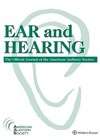
Journal Reviews
Help seeking for tinnitus – experiences of the diagnostic and treatment process
Population-based and self-selecting adult participants of this Australian cohort study (n=281) completed survey questions exploring varied outcome measures related to tinnitus. Primary outcomes assessed communication of initial tinnitus diagnoses and subsequent treatment offering, with participants rating their satisfaction at the...
Are we now safe at work?
Fifty years is a long time, yet the years pass in a blink of an eye. Where are we in comparison to where we were then, in terms of the occupational protection from noise exposure and ototoxicity, other than being...
All present and correct
You have ear protection, but are you using it properly? What are the risks over time? The design of standard earplugs has changed a lot in a decade. Earplug attenuation did reduce over time but still remained safe, however the...
Vascular disease and sudden sensorineural hearing loss
Oussoren et al performed a systematic review and meta-analyses of current literature on the above topic: specifically, cardiovascular risk factors for developing idiopathic sudden sensorineural hearing loss (iSSNHL), the presence of white matter hyperintensities in patients with iSSNHL and the...
The decision-making process by parents of children with residual hearing who receive cochlear implants
It can be a difficult decision for parents whose children have residual hearing whether or not to undergo cochlear implantation. Their children may seem to be hearing with their hearing aids, and even in some cases can hear without aids....
Ego-resiliency and tinnitus
Adults with tinnitus are 2.5 more likely to suffer with depression and anxiety. Ego-resiliency is the ability of a person to adapt to change and cope in difficult situations. This study aimed to determine whether ego-resiliency is related to perceived...
What is in the Fountain of Youth?
Does the auditory system have to age? Can we become more like turtles or jellyfish and keep our internals running without degradation? This essay considers the theoretical underpinnings of biological processes in the cochlear, in particular the role of the...
Does salvage treatment in sudden sensorineural hearing loss work?
Many treatment strategies for sudden sensorineural hearing loss (SSNHL) have been discussed, but the high spontaneous recovery rate (32-65%) of idiopathic SSNHL and differing treatment guidelines make comparing outcomes difficult. Systemic steroids are the most common first-line therapy with significant...
Effects of diet and exercise on tinnitus
Subjective tinnitus is the perception of sound without any external stimulus. There is no consensus on the aetiology of tinnitus. Obesity is one condition that has been associated with subjective tinnitus. The authors conducted a randomised controlled trial to assess...
What are the risk factors for new onset tinnitus?
Factors associated with tinnitus have mainly been studied cross-sectionally. Tinnitus is associated with hearing loss, noise exposure, ototoxic medication, head and neck trauma, smoking and depression and anxiety. Only a few studies exist that report on risk factors for developing...
Small but significant
These authors try to circumnavigate the conundrum of what is influenced by what. For something so small, the impact of the Stria Vascularis cannot be understated. The difficulty in reviewing the influence of loop diuretics or aminoglycosides on the Stria...
A twitch in time with a flicker of knowledge
The middle ear muscles can be seen as one of the ear’s safety mechanisms, and the interplay between eyes and ears has been established; think vestibular ocular reflex (VOR) or semi-circular canal dehiscence (SCCD). But can this protective mechanism be...















